|
|
|
Sort Order |
|
|
|
Items / Page
|
|
|
|
|
|
|
| Srl | Item |
| 1 |
ID:
183474
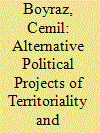

|
|
|
|
|
| Summary/Abstract |
Following the Arab Spring and the Syrian war, two non-state actors, the Islamic State (IS; also known as ISIS or ISIL) and the Democratic Union Party (PYD), deployed their political projects of the caliphate and democratic confederalism, respectively, amid rising geopolitical interest in the Middle East. Beyond mobilising people on the battleground in Syria, these political projects led to comprehensive debates about the future of the Westphalian order of sovereignty, territoriality, and the state in the region, as well as the viability of the ideals of political and cultural pluralism. This article compares the potential of these projects. First, it explores whether these actors challenge the older forms of the state, territoriality, and sovereignty, or whether they reproduce them. Then, it discusses whether the political organisation and governance models of these two non-state actors have the capacity to solve the problems of democratic representation and cultural pluralism in the region. Finally, the potential impact of these projects is discussed by examining whether they could serve as a model or inspiration for new political ideas and arrangements in the region.
|
|
|
|
|
|
|
|
|
|
|
|
|
|
|
|
| 2 |
ID:
183480
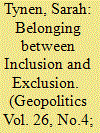

|
|
|
|
|
| Summary/Abstract |
Research on Uyghur communities in China often focuses on the power and oppression of the Chinese state, neglecting the power situated in the domestic sphere and women’s bodies. My research addresses how younger Uyghur women (aged 18–35 years old) feel suffocated by the expectations of their ethnocultural identity, and how those women both conform to and reject social norms. The themes of marriage and clothing illustrate how representations and discourses of the female body reinforce the boundaries of the Uyghur community. The pleasure and pain of Uyghur identity manifests in women’s bodies during territorial insecurity of fading nationalist space. Multiple scales of identity in the body and household disrupt the imaginary cohesiveness and boundedness of territory. While the Chinese state polices Uyghur bodies, so too does Uyghur society police the bodies of other Uyghurs – especially women – as a security strategy of bordering the nation.
|
|
|
|
|
|
|
|
|
|
|
|
|
|
|
|
| 3 |
ID:
183468
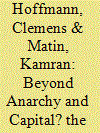

|
|
|
|
|
| Summary/Abstract |
The drylands of the Middle East have been long seen not only as unfavourable to life, but also and relatedly, socio-politically fragile. Fraught with myths of eternal ‘ethnic’, ‘sectarian’, or ‘resource conflict’, the chronic political instability of the Middle East from Afghanistan and Yemen to Iraq and Syria has been often seen as intrinsic to a scarce ‘nature’, a scorched earth, tendentially collapsing into brute violence which in its spectacular extreme has been exercised by the so-called ‘Islamic State’ (IS)
|
|
|
|
|
|
|
|
|
|
|
|
|
|
|
|
| 4 |
ID:
183470


|
|
|
|
|
| Summary/Abstract |
Women have been central to the revolution in Rojava, leading to widespread interest in the Kurdish women’s movement across Western contexts. Yet Western mass media representations of women combatants tend to be objectifying and superficial, glossing over the unique variety of feminism, known as “jineology,” that is core to the political system of Rojava, which operates according to the ideology of “democratic confederalism.” This paper is intended as a corrective to the inadequate representation of the theory and praxis of the women’s movement in Rojava. It approaches this task by: (a) critiquing the popular representation of women in Rojava, and (b) providing an overview of some of the features of the distinctive feminism that are in operation, with a focus on intersectionality, autonomous spaces, and combatting masculinity.
|
|
|
|
|
|
|
|
|
|
|
|
|
|
|
|
| 5 |
ID:
183473


|
|
|
|
|
| Summary/Abstract |
The Kurdish-led project of democratic confederalism in Rojava (north and north-east Syria) has emerged as an unprecedented experience in eco-feminist and anti-capitalist direct democracy with global significance and regional ramifications. There is however virtually no critical engagement with the project’s intellectual foundations in the works of Abdullah Öcalan. This paper seeks to address this gap through a sympathetic critique of Öcalan’s historical sociology of the formation and dissolution of the state. It argues that there is a theoretical tension in Öcalan’s argument. His account of the originary rise of the Sumerian state is ‘internalist’ while his analysis of subsequent state-formation processes is ‘interactive’, which highlights the crucial role of external factors and hence implicitly the decisive significance of the condition of ‘societal multiplicity’. The paper then draws on Kojin Karatani’s ‘modes of exchange’ based world history to argue that Sumerian state-formation was also fundamentally interactive occurring within and through societal multiplicity. It therefore demonstrates the need for the incorporation of societal multiplicity in the conceptualisation of democratic confederalism and the analyses of its prospects as a non-statist political community. In so doing, the paper also contributes to critical geopolitics and anarchist international theory through underlining the social history of the rise of the state and the international nature of its dissolution.
|
|
|
|
|
|
|
|
|
|
|
|
|
|
|
|
| 6 |
ID:
183471
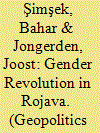

|
|
|
|
|
| Summary/Abstract |
Kurdish women fighters of the Women’s Protection Unit, YPJ (Yekîneyên Parastine Jin) received considerable attention in Western Europe and the United States. They made the headlines of mainstream newspapers and magazines. The emergence of an all-women, secular military force in the Middle East initiated a multi-layered process of conditional recognition of the Kurdish struggle – a ‘recognition’ in the sense of wide media coverage, but ‘conditional’ since it sought to divorce the feminist approach from its very specific political narrative and then reconnect it with Western liberalism. This paper critically delves into questions of a gendered geopolitics that portrays the Kurdish (feminist) struggle in the US popular discourses while silencing the voices of women and ignoring its historical roots and development. Based on an analysis of articles published in The Washington Post, New York Times, and Newsweek about the struggle for Kobane, we discuss the ways in which geopolitics, Orientalism and gender are interrelated in reports about this struggle. One of our main conclusions is that not despite, but rather through, the portrayal of Kurdish women fighters as heroines–even as angels–the idea of the Middle East was reproduced as a geography of fear, backwardness, and violence. The images of Kurdish women fighters may have superficially appeared to suggest a recognition of their struggle, this is a recognition that works through the presentation of images (portrait) at the expense of silencing the voices of the actors engaged in a struggle for a project that envisages a non-statist democracy. Although the portrayal of this struggle in Western media, in which the image of struggling women is disconnected from their politics, does not contribute to a recognition of their struggle, the women’s enunciation of their struggle in historical and political terms pushes the door for the audibility of Kurdish women’s voices.
|
|
|
|
|
|
|
|
|
|
|
|
|
|
|
|
| 7 |
ID:
183478


|
|
|
|
|
| Summary/Abstract |
Dualistic spatial demarcations of a (peaceful) here and a (violent) there, near and far, global north and south are constant companions of social research. From the perspective of (political) science their task is to put in order the intricate social dynamics and entangled international spaces of peace and war. Casting complex and contested conflict realities into the frames of hegemonic patterns of interpretation (“north vs. south”, “strong state vs. failed state”) and visually shifting the causes of conflicts to the “spaces of violence” in the global south, cartographic representations are central to Eurocentric spatial fixations of conflict, peace and violence in political science and beyond. Against the reductionism of common spatial meta-narratives (state container, deterritorialization) our contribution argues for a reflexive use of Eurocentric spatial imaginations in general and maps in particular.
|
|
|
|
|
|
|
|
|
|
|
|
|
|
|
|
| 8 |
ID:
183475
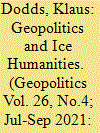

|
|
|
|
|
| Summary/Abstract |
This paper develops further interrogation into ‘icy geopolitics’ and what it might tell us about how we treat substances like ice as geopolitical matter. It brings together various literatures that speak to ice as a substance and substantial matter. Second, ice is represented and experienced in a multitude of ways, from oral cultures of indigenous communities living and working in the Arctic and mountainous environments. This matters again because ice as metaphor is often complicitous with the settler colonial framing of empty, unstable and ungoverned spaces. The paper takes this icy interrogation and brings it into contact with the experiences and struggles of Arctic peoples and states alongside non-Arctic states that seek to press their interests in the midst of ongoing melting and thawing. Icy geopolitics is being reconfigured; melting is said to be ‘triggering’ further expressions of territorial colonization and resource extraction and/or commitment towards indigenous autonomy, stewardship and conservation. The territorial volume is being put to work while at the same time it is being melted, thawed, opened and closed by human and more than human forces.
|
|
|
|
|
|
|
|
|
|
|
|
|
|
|
|
| 9 |
ID:
183472
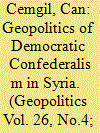

|
|
|
|
|
| Summary/Abstract |
The emerging socio-political entity of the Democratic Federation of Northern Syria (DFNS), lauded and criticised for its proclaimed progressive model, gave rise to by now a sizable literature on its now seven-year-old self-styled stateless, gender-egalitarian, ecological, direct-democratic social experiment that is referred to as democratic confederalism. Its alternative spatiality, however, received relatively less attention. In cases when it did, the dominant spatial organisation of political rule, that is, exclusive, national and territorial statehood became the point of reference. Building on the always contested and never absolute nature of the modern spatiopolitical order, this paper raises the problem of alternative spatial organization of political rule on the basis of the democratic confederalist experiment in Northern Syria. Drawing on a notion of strategies of spatialisation, understood as the practical ways of agents to deal with what is external to them as part of reproducing themselves and their spatiality, it argues that democratic confederalism as the spatialisation strategy of the DFNS constitutes an alternative mode of spatialisation, but its concrete shape is determined as much by its interaction with the spatialisation strategies of others, that is, by geopolitics, as it is by the practices and intentions of those who formulated it.
|
|
|
|
|
|
|
|
|
|
|
|
|
|
|
|
| 10 |
ID:
183479


|
|
|
|
|
| Summary/Abstract |
Recent years have witnessed a growing interest in the ‘borderscapes’ concept in border studies and cognate fields. However, there is a lack of dialogue amongst the proliferating case studies that have adopted the borderscapes concept. Arguably, the theoretical and methodological vagueness of the concept renders it highly appropriable. Yet, articulation of the existing patterns and common conceptual apparatus are necessary for theoretical development and clarity. This paper examines a range of analytical and methodological applications of the concept for their practical implications in human geography by studying the institutionalisation of violence in Melilla – a small Spanish enclave in North Africa. It argues that revisiting Lefebvre’s theory on the ‘production of space’ may be useful for approaching the production of borderscapes through social practices and discursive tools. By examining the place and importance of imagination and experience in conflict situations in this border town, this paper clarifies how the borderscapes concept can be operationalised for analytical and methodological use in bottom-up border research. In doing so, this paper encourages a sustained dialogue between these diverse case studies by challenging the practical application of the borderscapes logic in field research and data analysis.
|
|
|
|
|
|
|
|
|
|
|
|
|
|
|
|
| 11 |
ID:
183477


|
|
|
|
|
| Summary/Abstract |
This paper explores how processes of visuality produce geopolitical imaginaries of the West Bank in the everyday register. Drawing on the visual geopolitics literature, I turn to a grounded approach of ethnographic observation to consider how the West Bank is framed for international tourists. I trace two guided tours of the West Bank with attention to the differences in the visual, discursive, and embodied practices that constitute their scopic regimes. By analysing the sights tourists are allowed to see or made to see, I illuminate the geopolitical implications of how the West Bank is framed: the scopic regime of mainstream tourism normalises the Israeli military occupation by obscuring its violence, while the critical gaze of alternative tourism seeks to challenge it by foregrounding its violence. The juxtaposition ultimately reveals the complicity of both types in sustaining the asymmetrical logics of occupation.
|
|
|
|
|
|
|
|
|
|
|
|
|
|
|
|
| 12 |
ID:
183476


|
|
|
|
|
| Summary/Abstract |
Over the last decade(s), the European Union (EU) has established itself as geopolitical actor seeking to actively engage in the spatial ordering of its neighbourhoods. In order to better understand the existing geopolitical nature of the EU, this article addresses the question of the EU’s decade-long endeavour to construct legitimacy in its Northern Neighbourhood; an area often neglected in discussions about the EU’s geopolitical role. By examining its Arctic involvement between 2008 and 2018, this article enquires into the EU’s broader role as an international actor with an evolving geopolitical identity. Over the last decades, the EU has exhibited geopolitical ambitions alongside its own conceptualisation of world order, rule of law and good governance. This article establishes a clearer picture on how the EU as an amalgamation of its various institutions has tried to impose these geopolitical ambitions on a neighbouring region that itself experiences a manifold change in the early twentieth-first century. It gets to the conceptual bottom of what exactly fashioned the European Union with geopolitical agency in the Arctic region – internally and externally. The article is based on a decade of research on the EU as an emerging Arctic actor
|
|
|
|
|
|
|
|
|
|
|
|
|
|
|
|
| 13 |
ID:
183469


|
|
|
|
|
| Summary/Abstract |
The transformation of the Kurdish Freedom Movement towards Democratic Confederalism has promised a new horizon for emancipatory political organisation. This article examines the relationship between Bookchin’s political theory of communalism and Öcalan’s democratic confederalism informed by various lived practices of the Kurdish Freedom Movement. After situating this movement in the geopolitics of the contemporary Middle East and international relations, the article explores the social and historical framework of Bookchin’s theory and its specific rejection of hierarchy that has been taken up conceptually and politically by Öcalan. We trace this in the dissolution of the PKK and the adoption of the new paradigm of democratic confederalism. The second part examines this organisational basis of the Kurdish Freedom Movement’s in its support for local, autonomous, and federated, forms of direct democracy and the complementarities between Bookchin’s and Öcalan’s theorisation of communalism and confederalism. Finally, we look at the regional and international organisational and political implications of the transformation of the Kurdish Freedom Movement in its shift away from Marxist-Leninism, nationalism, and statism, towards communalism and examine both the challenges and opportunities facing this revolutionary process.
|
|
|
|
|
|
|
|
|
|
|
|
|
|
|
|
|
|
|
|
|